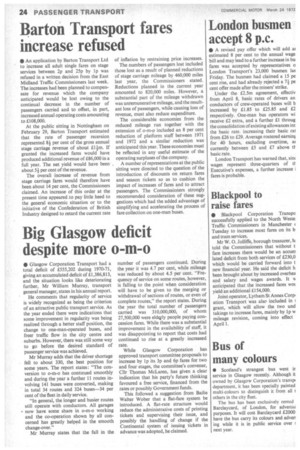Big Glasgow deficit despite more o-m-o
Page 26

If you've noticed an error in this article please click here to report it so we can fix it.
• Glasgow Corporation Transport had a total deficit of £555,202 during 1970-71, giving an accumulated deficit of £1,386,813, and the situation looks like deteriorating further, Mr William Murray, transport general manager, states in his annual report.
He comments that regularity of service is widely recognized as being the criterion of an attractive public transport service. As the year ended there were indications that some improvement in regularity was being realized through a better staff position, the change to one-man-operated buses, and freer traffic flow in the city centre and suburbs. However, there was still some way to go before the desired standard of passenger service was achieved.
Mr Murray adds that the driver shortage fell to about 330, the best position for some years. The report states: "The conversion to o-m-o has continued smoothly and during the year a further 11 routes involving 141 buses were converted, making in total 34 routes and 324 buses-34 per cent of the fleet in daily service.
"In general, the longer and busier routes still operate with conductors. All garages • now have some share in o-m-o working and the co-operation shown by all concerned has greatly helped in the smooth change-over."
Mr Murray states that the fall in the number of passengers continued. During the year it was 4.7 per cent, while mileage was reduced by about 4.5 per cent. "Frequency of service on some routes, however, is falling to the point when consideration will have to be given to the merging or withdrawal of sections of routes, or even of complete routes," the report states. During the year the total number of passengers carried was 310,000,000, of whom 27,500,000 were elderly people paying concession fares. While there was a substantial improvement in the availability of staff, it was disappointing to report that costs had continued to rise at a greatly increased rate.
While Glasgow Corporation has approved transport committee proposals to increase by 1 p its 3p and 6p fares for two and four stages, the committee's convener, ClIr Thomas McLaren, has given a clear indication that his party's future thinking favoured a free service, financed from the rates or possibly Government funds.
This followed a suggestion from Bailie Walter Wober that a flat-fare system be introduced. A flat-rate structure would reduce the administrative costs of printing tickets and supervising their issue, and possibly the handling of change if the Continental system of issuing tickets in advance was adopted, he claimed.




















































































































































